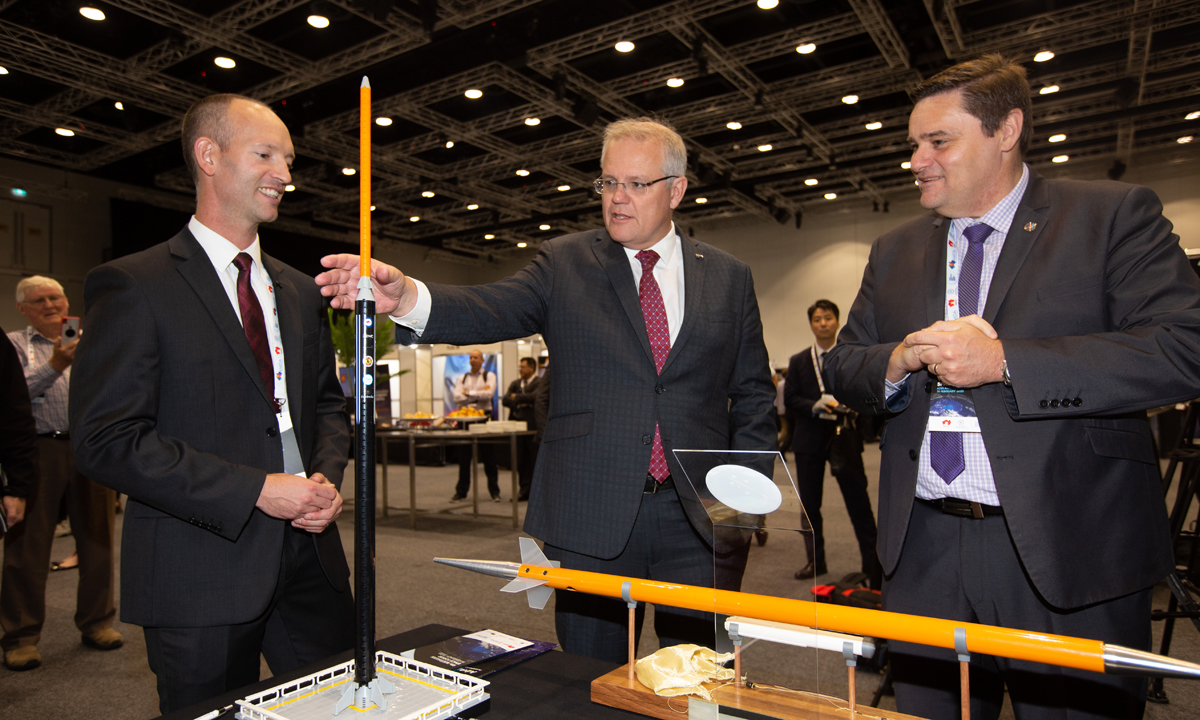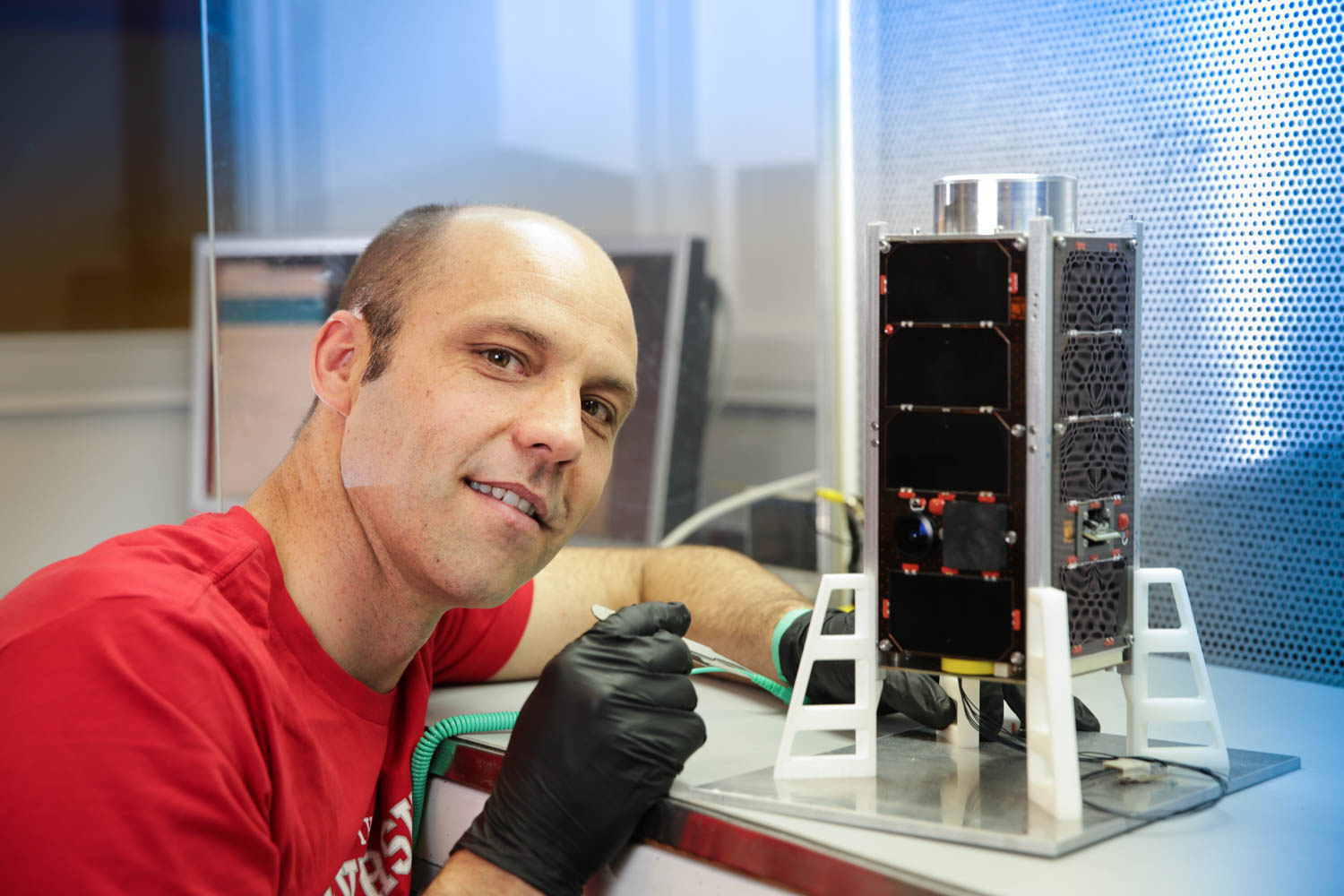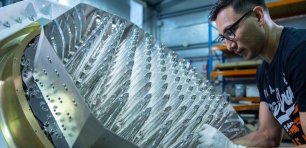
Fleet Space Technologies’ ground tracking station north of Adelaide. Source: The Lead
In a week of big announcements, three South Australian startups last week furthered their plans to support the international space industry.
All based in Adelaide, the companies include Fleet Space Technologies, Inovor Technologies and Southern Launch.
Southern Launch has been approved to conduct three rocket test launches from its site at Whalers Way reserve on the southern tip of the Eyre Peninsula in South Australia.
The State Commission Assessment Panel has approved Southern Launch to build the infrastructure required to commence three tests before December 31.

The Prime Minister of Australia Scott Morrison, centre, joined Lloyd Damp of Southern Launch, left, and Ian Spencer of DEWC Systems at the 9th Australian Space Forum in Adelaide last year for the announcement of the first payload to be launched from South Australia. Photo: James Knowler
Southern Launch will establish a permanent orbital facility near the local town of Port Lincoln, making it one of only two such facilities in the Southern Hemisphere.
Southern Launch is required to obtain a launch licence from the Australian Space Agency — also based in Adelaide — to secure the official dates of the tests.
The strict conditions of the development, including the Operational Environmental Management Plan (OEMP) will require consultation with South Australian government agencies and the local council.
The three launches will also be tested and managed for potential impacts during the test campaign.
The equipment and infrastructure will then need to be removed and the site returned for conservation, recreational and tourism purposes once the tests are completed.
Inovor’s small satellites
Inovor Technologies and Fleet Space Technologies both announced they are expanding their satellite capabilities.
Inovor founder and chief executive Dr Matthew Tetlow revealed the company, which had previously concentrated on Cubesats, will start building small satellites.
The company is developing a satellite called ‘Australis’ to meet Australia’s increased demand from Australian defence and science organisations for larger, sovereign space technologies.

Dr Matthew Tetlow of Inovor Technologies, based at Lot 14 in Adelaide, South Australia. Source: The Lead
The 250 kilogram Australis satellite is being developed at the Lot Fourteen innovation district in the CBD of Adelaide, which is also home to the Australian Space Agency and other space organisations such as the SmartSat CRC.
“We’re excited to be building upon the technology we have developed in our Apogee Cubesat bus and, with support from international partners, we will be expanding our capabilities with the Australis range of spacecraft,” Tetlow said.
“We’re able to enter the small satellite market earlier than planned, so we are, and we look forward to making another exciting announcement later in the year.”
Inovor Technologies will assist Australia’s defence and science organisations to conduct a broader range of missions using small satellites.
Grant funding for Fleet
Fleet Space Technologies, an Internet of Things company that has scheduled its sixth nanosatellite this month, has been awarded $386,770 as part of the Australian government’s Moon to Mars Supply Chain Capability Improvement grant program.
The grant will allow Fleet to be an emergent contributor in NASA’s Moon to Mars project.
This grant will enable Fleet Space to improve the capabilities of its agnostic hybrid satellite low-powered wide area network (LPWAN), as well as expanding on its already deployed solutions for partners SA Power Networks and mining company OZ Minerals, including collaborating to miniaturise and ruggedise sensors in the network.
Fleet Space chief executive Flavia Tata Nardini said winning this grant will establish Fleet Space as a leading company in the Australian space industry by growing its development of new technologies and increasing international supply chain capabilities.
“It is an exciting acknowledgment of the high quality of work we are producing right here in Australia, and a step towards scaling up our capacity for global space industry customers to access,” she said.
This article was first published by The Lead South Australia.
Handpicked for you

CSIRO and partners back new space startup Quasar Satellite Technologies with $12 million in funding



COMMENTS
SmartCompany is committed to hosting lively discussions. Help us keep the conversation useful, interesting and welcoming. We aim to publish comments quickly in the interest of promoting robust conversation, but we’re a small team and we deploy filters to protect against legal risk. Occasionally your comment may be held up while it is being reviewed, but we’re working as fast as we can to keep the conversation rolling.
The SmartCompany comment section is members-only content. Please subscribe to leave a comment.
The SmartCompany comment section is members-only content. Please login to leave a comment.